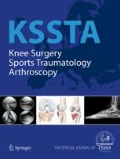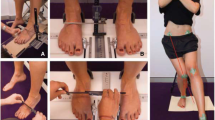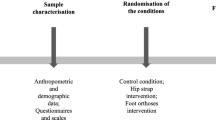Abstract
Purpose
To compare medial-to-lateral plantar forces during drop jump and single leg squat in individuals with and without patellofemoral pain.
Methods
This cross-sectional study compared 23 young adults with patellofemoral pain to 20 age- and sex-matched controls without knee pain. The plantar pressure distribution was collected during drop jump and single leg squat using pressure-sensitive Pedar insoles, inserted into a standard flat shoe. The primary outcome was the medial-to-lateral force, quantified as the peak force under the medial forefoot as the percentage of force under the total forefoot during drop jump. Secondary outcomes included peak medial-to-lateral force during single leg squat and mean forces during drop jump and single leg squat.
Results
The primary outcome showed that individuals with patellofemoral pain had a 22 % higher medial-to-lateral peak force during drop jump, (p = 0.03). Secondary outcomes showed 32 % higher medial-to-lateral peak force during single leg squat (p = 0.01) and 19–23 % higher medial-to-lateral mean force during drop jump and single leg squat (p = 0.02–0.04).
Conclusion
These findings indicate that individuals with patellofemoral pain display a more medially oriented loading pattern of the forefoot compared to individuals without knee pain. This loading pattern may be associated with the distribution of forces acting on the patellofemoral joint and suggest treatment of PFP should consider interventions that target normalisation of foot loading.
Level of evidence
III.




Similar content being viewed by others
References
Aliberti S, Costa Mde S, Passaro Ade C, Arnone AC, Hirata R, Sacco IC (2011) Influence of patellofemoral pain syndrome on plantar pressure in the foot rollover process during gait. Clinics (Sao Paulo) 66(3):367–372
Aliberti S, Costa MS, Passaro AC, Arnone AC, Sacco IC (2010) Medial contact and smaller plantar loads characterize individuals with patellofemoral pain syndrome during stair descent. Phys Ther Sport 11(1):30–34
Barnett S, Cunningham JL, West S (2001) A comparison of vertical force and temporal parameters produced by an in-shoe pressure measuring system and a force platform. Clin Biomech Bristol Avon 16(4):353–357
Barton CJ, Levinger P, Crossley KM, Webster KE, Menz HB (2012) The relationship between rearfoot, tibial and hip kinematics in individuals with patellofemoral pain syndrome. Clin Biomech 27(7):702–705
Barton CJ, Levinger P, Menz HB, Webster KE (2009) Kinematic gait characteristics associated with patellofemoral pain syndrome: a systematic review. Gait Posture 30(4):405–416
Barton CJ, Menz HB, Levinger P, Webster KE, Crossley KM (2011) Greater peak rearfoot eversion predicts foot orthoses efficacy in individuals with patellofemoral pain syndrome. Br J Sports Med 45(9):697–701
Boling MC, Padua DA, Marshall SW, Guskiewicz K, Pyne S, Beutler A (2009) A prospective investigation of biomechanical risk factors for patellofemoral pain syndrome: the joint undertaking to monitor and prevent ACL injury (JUMP-ACL) cohort. Am J Sports Med 37(11):2108–2116
Dierks TA, Manal KT, Hamill J, Davis IS (2008) Proximal and distal influences on hip and knee kinematics in runners with patellofemoral pain during a prolonged run. J Orthop Sports Phys Ther 38(8):448–456
Farrokhi S, Keyak JH, Powers CM (2011) Individuals with patellofemoral pain exhibit greater patellofemoral joint stress: a finite element analysis study. Osteoarthr Cartil 19(3):287–294
Huberti HH, Hayes WC (1984) Patellofemoral contact pressures. The influence of q-angle and tendofemoral contact. J Bone Joint Surg Am 66(5):715–724
Hurkmans HL, Bussmann JB, Benda E, Verhaar JA, Stam HJ (2006) Accuracy and repeatability of the pedar mobile system in long-term vertical force measurements. Gait Posture 23(1):118–125
Hurkmans HL, Bussmann JB, Selles RW, Horemans HL, Benda E, Stam HJ, Verhaar JA (2006) Validity of the pedar mobile system for vertical force measurement during a seven-hour period. J Biomech 39(1):110–118
Joseph M, Tiberio D, Baird JL, Trojian TH, Anderson JM, Kraemer WJ, Maresh CM (2008) Knee valgus during drop jumps in National Collegiate Athletic Association Division I female athletes: the effect of a medial post. Am J Sports Med 36(2):285–289
Kovacs I, Tihanyi J, Devita P, Racz L, Barrier J, Hortobagyi T (1999) Foot placement modifies kinematics and kinetics during drop jumping. Med Sci Sport Exer 31(5):708–716
Li G, DeFrate LE, Zayontz S, Park SE, Gill TJ (2004) The effect of tibiofemoral joint kinematics on patellofemoral contact pressures under simulated muscle loads. J Orthop Res 22(4):801–806
Mills K, Blanch P, Chapman AR, McPoil TG, Vicenzino B (2010) Foot orthoses and gait: a systematic review and meta-analysis of literature pertaining to potential mechanisms. Br J Sports Med 44(14):1035–1046
Molgaard C, Rathleff MS, Simonsen O (2011) Patellofemoral pain syndrome and its association with hip, ankle, and foot function in 16- to 18-year-old high school students: a single-blind case-control study. J Am Podiatr Med Assoc 101(3):215–222
Myer GD, Brent JL, Ford KR, Hewett TE (2011) Real-time assessment and neuromuscular training feedback techniques to prevent ACL injury in female athletes. Strength Cond J 33(3):21–35
Myer GD, Ford KR, Barber Foss KD, Goodman A, Ceasar A, Rauh MJ, Divine JG, Hewett TE (2010) The incidence and potential pathomechanics of patellofemoral pain in female athletes. Clin Biomech 25(7):700–707
Myer GD, Stroube BW, DiCesare CA, Brent JL, Ford KR, Heidt RS Jr, Hewett TE (2013) Augmented feedback supports skill transfer and reduces high-risk injury landing mechanics: a double-blind, randomized controlled laboratory study. Am J Sports Med 41(3):669–677
Nagura T, Dyrby CO, Alexander EJ, Andriacchi TP (2002) Mechanical loads at the knee joint during deep flexion. J Orthop Res 20(4):881–886
Neptune RR, Wright IC, van den Bogert AJ (2000) The influence of orthotic devices and vastus medialis strength and timing on patellofemoral loads during running. Clin Biomech 15(8):611–618
Noehren B, Hamill J, Davis I (2013) Prospective evidence for a hip etiology in patellofemoral pain. Med Sci Sport Exer 45(6):1120–1124
Powers CM (2010) The influence of abnormal hip mechanics on knee injury: a biomechanical perspective. J Orthop Sports Phys Ther 40(2):42–51
Powers CM, Bolgla LA, Callaghan MJ, Collins N, Sheehan FT (2012) Patellofemoral pain: proximal, distal, and local factors, 2nd international research retreat. J Orthop Sports Phys Ther 42(6):A1–54
Powers CM, Bolgla LA, Callaghan MJ, Collins N, Sheehan FT (2012) Patellofemoral pain: proximal, distal, and local factors, 2nd international research retreat. J Orthop Sports Phys Ther 42(6):A1–54
Puniello MS (1993) Iliotibial band tightness and medial patellar glide in patients with patellofemoral dysfunction. J Orthop Sports Phys Ther 17(3):144–148
Reiman MP, Bolgla LA, Lorenz D (2009) Hip functions influence on knee dysfunction: a proximal link to a distal problem. J Sport Rehabil 18(1):33–46
Snyder KR, Earl JE, O’Connor KM, Ebersole KT (2009) Resistance training is accompanied by increases in hip strength and changes in lower extremity biomechanics during running. Clin Biomech 24(1):26–34
Souza RB, Powers CM (2009) Differences in hip kinematics, muscle strength, and muscle activation between subjects with and without patellofemoral pain. J Orthop Sports Phys Ther 39(1):12–19
Taunton JE, Ryan MB, Clement DB, McKenzie DC, Lloyd-Smith DR, Zumbo BD (2002) A retrospective case-control analysis of 2002 running injuries. Br J Sports Med 36(2):95–101
Thijs Y, De Clercq D, Roosen P, Witvrouw E (2008) Gait-related intrinsic risk factors for patellofemoral pain in novice recreational runners. Br J Sports Med 42(6):466–471
Thijs Y, Van Tiggelen D, Roosen P, De Clercq D, Witvrouw E (2007) A prospective study on gait-related intrinsic risk factors for patellofemoral pain. Clin J Sport Med 17(6):437–445
Vicenzino B, Collins N, Cleland J, McPoil T (2010) A clinical prediction rule for identifying patients with patellofemoral pain who are likely to benefit from foot orthoses: a preliminary determination. Br J Sports Med 44(12):862–866
Willy RW, Manal KT, Witvrouw EE, Davis IS (2012) Are mechanics different between male and female runners with patellofemoral pain? Med Sci Sports Exerc 44(11):2165–2171
Wood L, Egger M, Gluud LL, Schulz KF, Juni P, Altman DG, Gluud C, Martin RM, Wood AJ, Sterne JA (2008) Empirical evidence of bias in treatment effect estimates in controlled trials with different interventions and outcomes: meta-epidemiological study. BMJ 336(7644):601–605
Wu CC, Shih CH (2004) The influence of iliotibial tract on patellar tracking. Orthopedics 27(2):199–203
Conflict of interest
No external funding was received for the current study. There is no conflict of interest.
Author information
Authors and Affiliations
Corresponding author
Rights and permissions
About this article
Cite this article
Rathleff, M.S., Richter, C., Brushøj, C. et al. Increased medial foot loading during drop jump in subjects with patellofemoral pain. Knee Surg Sports Traumatol Arthrosc 22, 2301–2307 (2014). https://doi.org/10.1007/s00167-014-2943-3
Received:
Accepted:
Published:
Issue Date:
DOI: https://doi.org/10.1007/s00167-014-2943-3




